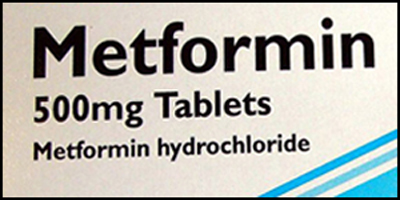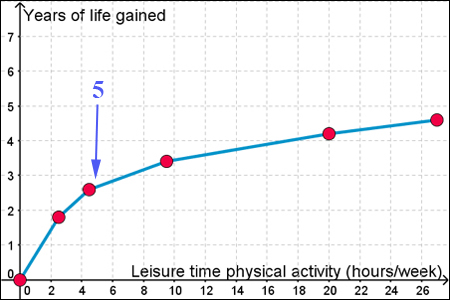The five main "take aways" from this web site according to research done by the the author are:
1) Diabetes Drug Metformin - A Major Increase In Lifespan

Metformin is the most popular prescription diabetes drug in the world, with over 60 million prescriptions filled in the US alone each year. During 2014, a UK study of 78,000 diabetes patients being treated with Metformin not only lived longer than other diabetic patients, but also lived 15% longer than the healthy control sample of 90,000 people. 15% longer is about 12 years or a nice age of about 92 years.
In 2015 Cardiff University in the UK found that when patients with diabetes were given the drug Metformin they in fact lived longer than others without the condition, even though they should have died eight years earlier on average. Lets settle for a 10 year increase as the average of the two studies.
When Belgian researchers tested Metformin on tiny roundworms, the worms not only aged slower, but they also stayed healthier longer. They did not slow down or develop wrinkles. Mice treated with Metformin increased their lifespan by nearly 40 per cent and their bones were also stronger.
Up until very recently, the US Food and Drug Administration viewed aging as a natural process that could not be stopped. However, the FDA has allowed a US aging trial to start in the fourth quarter of 2016 with its blessing. The clinical trial is called Targeting Aging with Metformin (TAME) and it is formally investigating whether the drug is capable of slowing and/or stopping degenerative human diseases and heart conditions. Scientists plan to recruit 3,000 people in their 70s and 80s who either have or are at risk of having major diseases. The trial, started in 2017, is expected to take seven years.
During our lifetime, billions of cell divisions must occur to keep our bodies functioning correctly. As we age and cell problems grow, the body can no longer quickly repair damage. In the case of cancer, cells no longer have the ability to get rid of mutations and tumors grow wildly. In Alzheimer’s the brain stops clearing out sticky plaques and dementia develops. The reason Metformin delays the aging process is because it "increases the number of oxygen molecules released into every cell"which is thought to boost robustness and longevity. Everyone should take 2,000 mg of Metforman every day. Top
2) Exercise Increases Lifespan

See the chart to the left from the Harvard affiliated Brigham and Women’s Hospital who investigated the correlation between regular exercise and rates of mortality. The graph indicates that moderate physical activity of 5 hours a week shows on average an increase of about 2.8 years of additional life (excluding additions from diet and other sources).
Even a little exercise is enough to reduce the risk of an early death by as much as 30 percent, British researchers say. "Efforts to encourage small increases in physical activity in inactive individuals likely have significant health benefits," said lead author Ulf Ekelund, a senior scientist at the University of Cambridge.
The risk reduction was seen in normal weight, overweight and obese people, Ekelund said. "We estimated that eradicating physical inactivity in the population would reduce the number of deaths twice as much as if obesity was eradicated." In other words, exercise is more important than weight loss. The effect of moderate exercise was greatest among normal weight people, but even overweight and obese people saw a benefit.
The U.S. Department of Health and Human Services (HHS) Guidelines recommend a minimum amount of adult (ages 18 to 64) exercise of 2.5 hours a week. This will add about 2 years to one's life. Research studies for "older" adults (ages 65 and older) consistently show that activity performed on at least 3 days a week produces health benefits. Spreading physical activity across at least 3 days a week helps to reduce the risk of injury and avoids excessive fatigue. Episodes of aerobic activity count towards meeting the Guidelines if they last at least 10 minutes and are performed at moderate or vigorous intensity. Top
3) A Good Diet Makes For A Healthy Weight And A Longer Lifespan

A study conducted by Wageningen University of the Netherlands followed 1,507 men and 832 women aged 70 to 90. The researchers analyzed deaths from all causes, and separately examined deaths from coronary heart disease, cardiovascular diseases and cancer. They found that consuming a Mediterranean diet lowered death by all causes by 23 percent, moderate alcohol use (defined as a few grams per day) was associated with a 22 percent lower risk, regular physical activity (defined as approximately 30 minutes activity per day) conferred a 37 percent lower risk and not smoking was associated with a 35 percent lower risk. Individuals who practiced all four of these factors lowered the risk of dying during the study period by 65 percent compared to those who practiced one or none.
The DASH diet is an American version of the Mediterranean diet. The initial DASH diet was developed by the US National Institutes of Health. Research showed that it lowered blood pressure as well as blood pressure medications. Since the initial research, numerous studies have shown that the DASH diet reduces the risk of several diseases, including some types of cancer, stroke, heart failure, kidney stones, and diabetes. It has also been proven to be an effective way to lose weight and to become healthier at the same time. All of these benefits led the DASH diet to be the #1 diet ranked by US News & World Report in 2011, 2012, 2013, and 2014. In 2017 the Mediterranean diet and the DASH diet were tied for #1.
Several recent DASH diet research projects that optimized the diet have shown even better results. Improved blood pressure results were obtained by cutting back on the "empty carbs" and adding in more protein and heart healthy fats. These improvements are also completely compatible with the latest research on how to achieve sustainable weight loss.
The DASH diet plan is a diet rich in fruits, vegetables, low fat or nonfat dairy. It also includes whole grains, lean meats, fish, poultry, nuts and beans. It is high in fiber and low to moderate in fat. It is a plan that follows US guidelines for sodium content along with vitamins and minerals. In addition to lowering blood pressure, the DASH plan lowers cholesterol and makes it very easy to lose weight. The DASH diet is thought to be easier to follow than the Mediterranean diet since it has more specific guidelines. The pumped up version for weight loss is lower in calories and discourages processed foods. For much more diet information click here. Top
4) Keep The Brain Healthy And Avoid Dementia

DHA (docosahexaenoic acid) is an omega-3 fatty acid found in fish oils that plays a central role in brain health. DHA is naturally found throughout the body, but is most abundant in the brain. Our brain is mostly fat, of which 60% is DHA. Just as calcium is essential for building strong bones, DHA ensures that the cells in the brain and other parts of the nervous system develop and function properly through all stages of life.
DHA not only turns on the growth of new brain cells, but offers protection for existing brain cells while it enhances the ability of one brain cell to connect to the next. DHA also acts as an anti-inflammatory. This is quite significant when one recognizes that inflammation is a key factor in both Alzheimer’s as well as Parkinson’s disease. And, DHA is active in controlling virtually every other neuro-degenerative condition.
A research team from the New Orleans School of Medicine in an April 2017 paper explained how DHA helps a damaged brain recover and keeps it functioning. Neuroprotectin D1 (NPD1) is a lipid messenger made from DHA on demand when cell survival is compromised. Oxidative stress, resulting from the constant production of damaging free radicals, lays the groundwork for cell death. Cell death is accelerated by catastrophic events like ischemic stroke.
The team found that about one hour after an experimental stroke, DHA triggered the production of NPD1. NPD1, in turn, increased the production of ring finger protein 146, which has been named Iduna. Iduna protects against a form of programmed cell death from stroke. Iduna, relatively little studied, turns out to be a key factor for cell re-programing and subsistence.
DHA is available as a supplement derived from fish oils as well as from marine algae. There is DHA in krill oil but the amount of DHA in krill oil is only about 10% of that found in fish oil. Eating fatty wild fish is a good source of DHA and clearly explains why fish is considered a “brain food.” DHA can be found in stores as a non-prescription supplement. Top
5) Lifestyle Is More Important Than Genes Until Age 90

“Most people think it’s their genes, but the data doesn’t support it,” says Cardiologist John Day of Intermountain Healthcare in Murray, Utah. Research on 3,000 pairs of twins who had the exact same genes, but as adults had different home and life choices, showed that only 25 percent of their longevity was due to genes. The other 75 percent was affected by lifestyle. Things within our control can make all the difference in lifespan.
A healthy lifestyle person doesn't smoke, tries to maintain a healthy weight, eats foods with plenty of fruits, vegetables and fiber and, of course, exercises on a regular basis. A healthy person also knows how to manage stress, gets good quality sleep, doesn't drink too much, doesn't sit too much - basically does everything in moderation all the time. When you look at everything that goes into a healthy lifestyle, you can see just how hard all of those things are in our current world.
In March, 2018 computational biologist Yaniv Erlich of Columbia University in New York City and his colleagues used crowd sourced data to make a family tree that linked 13 million people. The ancestry chart they developed is believed to be the largest verified resource of its kind - spanning an average of 11 generations. The group concluded that heredity explains only about 16% of the difference in life spans for these individuals. Most of the differences were due to other factors, such as where and how people lived.
Cell lines from blood samples of "centenarians" have significantly higher levels of the protein PARP than cell lines from younger 20 to 70 year old individuals. PARP is a family of proteins involved in a number of positive cellular processes, most notably "DNA repair". DNA is the molecule that carries the genetic instructions for the development, functioning and reproduction of all known living organisms. PARP's main role is to detect and initiate an immediate response to any single-strand DNA that breaks.
Geriatrician Thomas Perls, director of the New England Centenarian Study at Boston Medical Center, said research shows that behaviors have a greater influence on survival up until the late 80s in age. Most people have the right genes to get there as long as their behaviors are not harmful. But once people reach the 90s and beyond, genetics do play a significant role. “To get to the very oldest ages, you really have to have the right genes in your corner,” Perls says.
